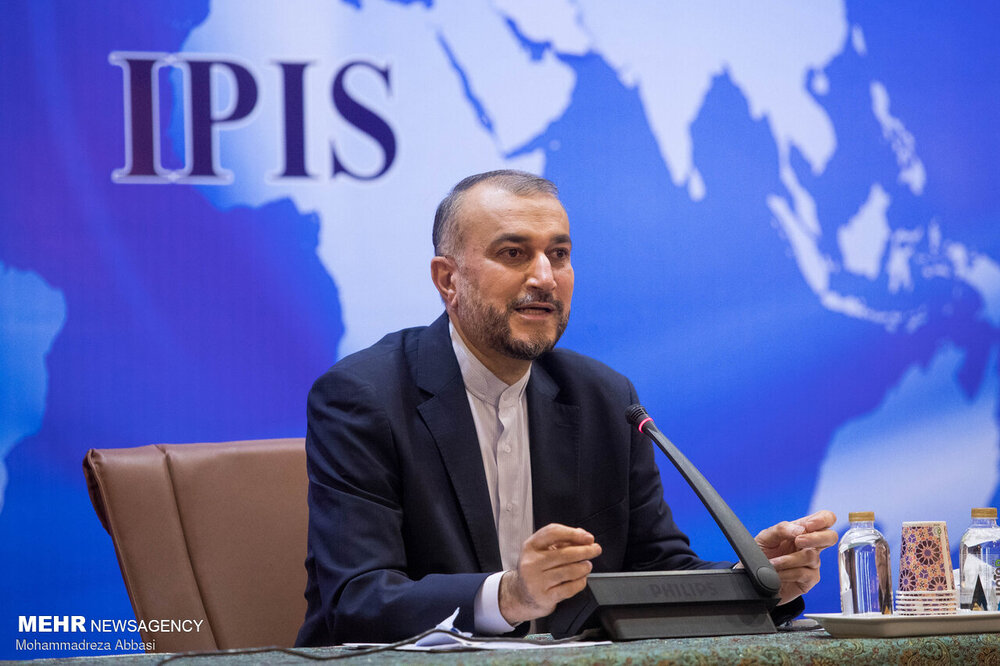Amir Abdollahian blames U.S. as chief culprit for violating nuclear deal

TEHRAN - Iranian Foreign Minister Hossein Amir Abdollahian said on Monday that Iran seeks “wise and solid negotiations” for reviving the 2015 nuclear deal, officially known as the Joint Comprehensive Plan of Action (JCPOA).
Abdollahian said Iran welcomes negotiations that guarantee the rights and interests of the Iranian nation.
“We believe in wise and solid negotiations that secure rights of the nation and will actively take measures towards that goal,” Abdollahian said in a meeting with foreign ambassadors and diplomatic missions in Tehran.
The top diplomat added Iran negotiations that only waste time would not be beneficial.
Negotiations for reviving the JCPOA began in April in Vienna. Six rounds of talks were held until June. The talks were intended to bring the U.S., as the violator of the deal, back into compliance.
Though significant progresses were made, the U.S. side, which was participating in the talks indirectly, raised new issues which were not related to the JCPOA. The raising of new issues, including Iran’s defensive missile program, led the negotiators fail to restore the agreement.
Since June 20 no talks have been held between Iran, the other remaining parties to the JCPOA – Britain, France, Germany, Russia and China – and the United States. The talks were suspended until the new government in Iran start its work.
Amir Abdollahian says Iran welcomes cooperation with all Europeans based on balanced foreign policy In his Monday remarks, Abdollahian elaborated about various aspects of the new Iranian administration’s foreign policy. He said the new Iranian government “believes in diplomacy as an effective tool and we will never distance from negotiations.”
He added, “We have a positive approach to negotiations as an opportunity to diplomacy, but believe that negotiations for the sake of negotiations will have no benefit for the Iranian nation and other involved parties,” Press TV reported.
The U.S. under President Trump quit the nuclear deal in 2018 and imposed the harshest sanctions in history against Iran. Trump had the illusion that he can force Iran to give in to his illegal demands through his “maximum pressure” campaign against the Islamic Republic.
The U.S. left the nuclear deal which was endorsed by UN Security Council Resolution 2231.
The Trump administration imposed a total ban on Iran’s oil export. He intended to strangulate the Iranian economy.
After Trump abandoned the JCPOA, his top diplomat Mike Pompeo said the U.S. will impose “the strongest sanctions in history” on Iran. Also in November 2018, John Bolton, who was the White House national security advisor at the time, said, “It’s our intention to squeeze them (Iranians) very hard… until the pips squeak.”
Former Iranian foreign minister Mohammad Javad Zarif called U.S. sanctions against Iran as instance of “economic terrorism”.
Despite pleas by international figures, the Trump administration even refused to relax sanctions during the deadly Coronavirus pandemic.
Due to economic and financial sanctions foreign companies even refused to sell medicine and medical equipment to Iran.
Zarif and his deputy Abbas Araqchi said sanctions against amid Iran amid the deadly pandemic is “crime against humanity”.
Also, on Monday Foreign Minister Abdollahian called the U.S. the chief culprit for violating the international nuclear deal.
“The Americans inflicted the worst harm on the JCPOA and not only are they accused [in this regard], but they are also the main culprit in violating the JCPOA,” Abdollahian asserted.
Though bans on Iran for importing medicine have been relaxed in recent months due to attempts by Switzerland, the sanction are still in place despite the fact that current U.S. President Joe Biden had expressed willingness to rejoin the JCPOA.
Abdollahian urged the European troika – France, Germany and Britain – to take action with respect to the JCPOA implementation, saying that the three states were, too, responsible for the U.S. refusal to lift sanctions against Iran and allow the nation to reap the benefits of the JCPOA.
The foreign minister said this issue has been conveyed to the president and foreign minister of France during his recent visit to Iraq and to his other counterparts in the European troika.
“The European troika has the opportunity to review and change its approach to show its firm determination in its interaction with Iran,” Abdollahian pointed out.
New Iranian President Ebrahim Raisi and his French counterpart Emanuel Macron have talked on phone two times over the last few weeks. In the last call, which was held on Sunday, Raisi expressed Tehran’s readiness for comprehensive cooperation with Europe. Raisi said such interaction could begin with the promotion of economic and trade ties with France.
Raisi’s foreign minister conveyed the same message on Monday, saying, “…we welcome [cooperation with] other European countries and are ready to pursue active and dynamic relations with them within the framework of a balanced foreign policy. We will pay attention to all continents and parts of the world in such a relationship."
Iran’s Foreign Ministry spokesman Saeed Khatibzadeh said earlier on Monday that negotiations on the JCPOA revival will continue in essence under the new administration.
“The [Vienna] negotiations will continue in essence. Iran has announced time and again that negotiations will continue to make sure that the United States will return to complete implementation of its obligations under the JCPOA and [UN Security Council] Resolution 2231 [which endorsed the accord],” he added.
The Western media outlets have been trying to demonize Iran’s nuclear program despite the fact that Iran is a signatory to the nuclear Non-Proliferation Treaty (NPT) and its nuclear activities are monitored by the International Atomic Energy Agency.
Barbara Slavin, an American foreign policy expert, says the American public is “woefully ignorant” about the JCPOA and wrongly believe that Iran has built nuclear arms.
“Most Americans are woefully ignorant about the Iran deal – a majority believes Iran has nuclear weapons,” Slavin tells the Tehran Times.
She also said, Unfortunately, those who are extremely hawkish about Iran have a loud voice in the U.S. media.”
Leave a Comment